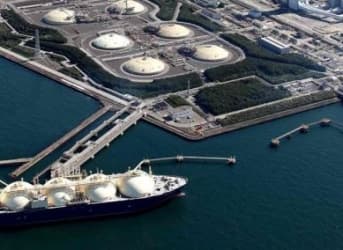Japan’s record purchases of liquefied natural gas (LNG) show no sign of slowing as the country continues to try and fill the energy shortfall created when it took its nuclear plants offline three years ago.
With its lack of substantial domestic sources of fossil fuel, Japan is cripplingly dependent on imported oil, coal, and natural gas. Before the 2011 meltdown of the Fukushima nuclear plant, Japan was the third largest nuclear generator in the world, behind the United States and France, with 54 reactors.
Those reactors were critical to cutting Japan’s fuel import bills, and accounted for 20 percent of the country’s electricity generation. But post-Fukushima, the sum total of Japan’s nuclear power plants were shuttered and imports of fossil fuels, particularly LNG, have skyrocketed.
Related: Innovation Needed To Provide Zero-Carbon Destination For Gas
Japan has undertaken a heroic effort to replace that lost capacity. It instituted one of the world’s most generous feed-in-tariffs for solar energy, which is essentially a guaranteed price for solar developers. That made Japan a hot spot for solar development nearly overnight: it installed 7 gigawatts of solar power for the fiscal year ending in March.
Other efforts included conservation and electricity rationing to avoid overstressing the grid. Taken together, the inspiring efforts by the Japanese people helped avoid severe electricity shortages.
Nevertheless, Japan is still importing an enormous volume of LNG to fuel its power plants. For the first eight months of 2014, Japan’s LNG imports averaged 11.85 billion cubic feet per day (bcf/d) according to the U.S. Energy Information Administration. That is near a record high.

Japan is by far the world’s largest importer of LNG. Dependence on imported energy is sapping the country’s economy and has fueled more than two years of consecutive monthly trade deficits. This is causing the Japanese yen to weaken, making imports yet more expensive.
Japan is trying to mitigate this vulnerability, and several of the country’s largest LNG importers are joining forces to create a buyer’s pact.
The issue at hand is the quirky pricing that reigns over LNG deals. Traditionally, LNG is sold under long-term contracts with prices linked to the price of oil. But in many places of the world – the U.S. in particular – natural gas has become significantly cheaper than oil on an energy-equivalent basis. But in Asia, importers often still pay the higher oil-linked price for LNG.
Japan hopes to change that. Two large Japanese companies, Tokyo Electric Power Company (owner of the crippled Fukushima power plant) and Chubu Electric Power Company agreed earlier this month to cooperatively negotiate contracts with LNG suppliers. By banding together, they believe they will have enhanced leverage.
Together, they plan on jointly purchasing 35 to 40 million metric tons of LNG per year (mtpa), which amounts to around half of Japan’s total LNG consumption.
But for a country so dependent on LNG imports, wouldn’t it seem that they actually have very little leverage over pricing?
Working in Japan’s favor are the massive supplies that are set to come online over the next four years. Australia is set to surpass Qatar is the largest LNG exporter by 2018, with 62 mtpa of LNG capacity under construction. In other words, Australia is expected to quadruple its LNG export capacity in four years.
Related: Does This $1.5 Billion Shale Purchase Signal A Change?
Add to that the series of projects under construction in the United States. As a result, LNG supplies, while pretty tight in the short-term, will surge in the coming years, which is likely to cause prices to decline. Moreover, merely on the expectation that prices will decline, Japanese buyers are balking at the prices being demanded by suppliers.
ADVERTISEMENT
Instead, Japan is pushing for more of a liquid spot market based on supply and demand fundamentals. And given the trajectory of the market, many analysts think this is inevitable. “The shift away from oil-based pricing can be made, will be made, and must be made,” Craig Pirrong, a professor at the University of Houston said in a study.
Even BHP Billiton, a major LNG supplier, seems resigned to the inevitable. “BHP believes that LNG will behave like any other commodity and that is that it will be priced on its merits — and that will happen over time,” BHP’s CEO Mike Henry said at a conference.
That is good news for Japan. Given the country’s dependence on imports, it can’t happen soon enough.
By Nick Cunningham of Oilprice.com
More Top Reads From Oilprice.com:
- Petronas Threatens To Scrap Canadian LNG Terminal Over Tax Rates
- The 10 Worst Energy-Related Disasters Of Modern Times
- U.S. And Australia Chasing Qatar for LNG Supremacy


















